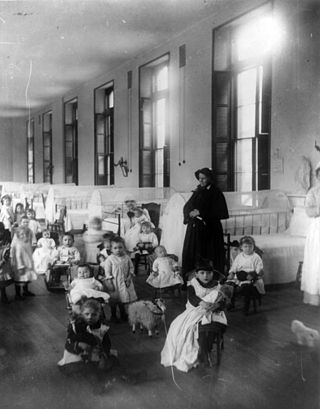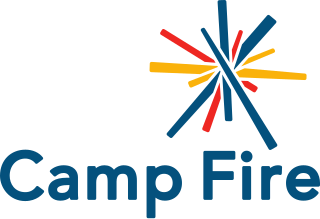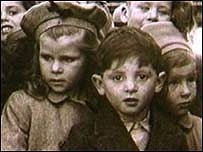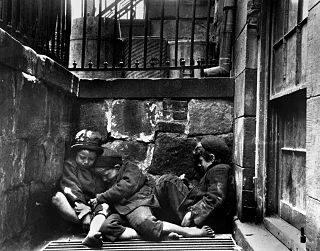
Adoption is a process whereby a person assumes the parenting of another, usually a child, from that person's biological or legal parent or parents. Legal adoptions permanently transfer all rights and responsibilities, along with filiation, from the biological parents to the adoptive parents.

Camp Fire, formerly Camp Fire USA and originally Camp Fire Girls of America, is a co-ed youth development organization. Camp Fire was the first nonsectarian, multicultural organization for girls in America. It is now gender-inclusive, and its programs emphasize camping and other outdoor activities.

Foster care is a system in which a minor has been placed into a ward, group home, or private home of a state-certified caregiver, referred to as a "foster parent", or with a family member approved by the state. The placement of a "foster child" is normally arranged through the government or a social service agency. The institution, group home, or foster parent is compensated for expenses unless with a family member.
Emancipation of minors is a legal mechanism by which a minor before attaining the age of majority is freed from control by their parents or guardians, and the parents or guardians are freed from responsibility for their child. Minors are normally considered legally incompetent to enter into contracts and to handle their own affairs. Emancipation overrides that presumption and allows emancipated children to legally make certain decisions on their own behalf.
In the United States, adoption is the process of creating a legal parent–child relationship between a child and a parent who was not automatically recognized as the child's parent at birth.

Boys & Girls Aid is a non-profit organization that provides services to children in crisis in the state of Oregon, United States.
Kinship care is a term used in the United States and Great Britain for the raising of children by grandparents, other extended family members, and unrelated adults with whom they have a close family-like relationship such as godparents and close family friends because biological parents are unable to do so for whatever reason. Legal custody of a child may or may not be involved, and the child may be related by blood, marriage, or adoption. This arrangement is also known as "kincare" or "relative care." Kinship placement may reduce the number of home placements children experience; allow children to maintain connections to communities, schools, and family members; and increase the likelihood of eventual reunification with birth parents. It is less costly to taxpayers than formal foster care and keeps many children out of the foster care system. "Grandfamily" is a recently coined term in the United States that refers to families engaged in kinship care.
The Massachusetts Society for the Prevention of Cruelty to Children (MSPCC) is a non-governmental charitable organization with offices in Boston and throughout Massachusetts which seeks to strengthen families and prevent child abuse through essential child welfare and mental health treatment and effective public advocacy.

The Adoption and Safe Families Act was signed into law by President Bill Clinton on November 19, 1997, after having been approved by the United States Congress earlier in the month.
In clinical diagnostic and functional development, special needs refers to individuals who require assistance for disabilities that may be medical, mental, or psychological. Guidelines for clinical diagnosis are given in both the Diagnostic and Statistical Manual of Mental Disorders and the International Classification of Diseases 9th edition. Special needs can range from people with autism, cerebral palsy, Down syndrome, dyslexia, dyscalculia, dyspraxia, dysgraphia, blindness, deafness, ADHD, and cystic fibrosis. They can also include cleft lips and missing limbs. The types of special needs vary in severity, and a student with a special need is classified as being a severe case when the student's IQ is between 20 and 35. These students typically need assistance in school, and have different services provided for them to succeed in a different setting.
In the United States, Child and Family Services Reviews (CFSR) are conducted by the federal Children's Bureau, within the United States Department of Health and Human Services, to help states improve safety, permanency and well-being outcomes for children and families who receive services through the child welfare system. The Bureau conducts the reviews to ensure conformity with federal child welfare requirements, to determine what is actually happening to children and families in child welfare services, and to assist states in helping children and families achieve positive outcomes. The CFSRs monitor States' conformity with the requirements of title IV-B of the Social Security Act. The first round of reviews took place between 2000 and 2004 and the second round took place between 2007 and 2010. In both rounds, all States were required to implement Program Improvement Plans (PIPs) as part of the review process. The third round of CFSRs took place between 2015 and 2018; a complete aggregate report of those findings has yet to be released.
An adoption tax credit is a tax credit offered to adoptive parents to encourage adoption in the United States. Section 36C of the United States Internal Revenue code offers a credit for “qualified adoption expenses” paid or incurred by individual taxpayers.

DePelchin Children's Center, founded in 1892 in Houston, Texas, is a nonprofit organization focused on supporting and sustaining children and the families who care for them. DePelchin provides a range of services for children and families — it is an accredited foster care and adoption agency, and it also provides residential treatment for youth in foster care, as well as serving youth who are about to age out of foster care or have recently aged out of foster care. DePelchin’s services also include counseling, parenting classes, and other services focused on protecting children and keeping families strong. The center continues to be recognized at the state and federal level for cutting-edge programs, including a federal grant as a leading child trauma expert in Texas.

The Des Moines Public Library (DMPL) is the public library system for the city of Des Moines, Iowa. It is the largest public library system in the state of Iowa, with a collection of 552,576 items housed at six locations.

Foster care is the term used for a system in which a minor who has been made a ward or a non-minor, typically aged 18–21, who volunteers for placement, is placed in a relative placement, a non-related extended family (NREFM) placement, a community family home, an institution, or a group home. Relative, NREFM, and community caregivers certified by the state are typically referred to as "foster parents," "kin caregivers," "resource parents," or other local terms. The placement of the child is usually arranged through state or county social services. The institution, group home, or caregiver is reimbursed for the expenses related to caring for the child. The state via the family court and child protection agency stand in loco parentis to the minor, making all legal decisions, while the caregiver is responsible for the day-to-day care of the minor. Even while their child is in Care, typically birth parents retain Education and Medical rights and the right to contact with their child unless parental rights are terminated by the Court.

David Meade is an American politician and Republican member of the Kentucky House of Representatives representing Kentucky's 80th House district since January 2013. His legislative district includes Garrard and Lincoln Counties as well as part of Pulaski County. Meade serves as Speaker pro tempore of the Kentucky House of Representatives, a constitutional office and the second-highest position in the 100-member legislative chamber.

The Preventing Sex Trafficking and Strengthening Families Act is a US bill that would address federal adoption incentives and would amend the Social Security Act (SSA) to require the state plan for foster care and adoption assistance to demonstrate that the state agency has developed policies and procedures with respect to the children it is working, and which are (possibly) a victim of sex trafficking or a severe form of trafficking in persons. The bill furthermore requires states to implement the 2008 UIFSA version, which is required so the 2007 Hague Maintenance Convention can be ratified by the US.

The New York City Administration for Children's Services (ACS) is a New York City government agency that prosecutes parents, caregivers, and juveniles in child protective service and delinquency proceedings in New York City. ACS has been the subject of numerous civil rights lawsuits involving the wrongful removals and deaths of children as well as constitutional violations of both parents and children.
Josh Shipp, is an American motivational speaker for teachers, best-selling author, and TV personality. He is most known for his TEDx talk entitled "Every Kid is One Caring Adult Away from Being a Success Story" and his television programs including Teen Trouble which aired on Lifetime and A&E executive produced by Ellen Rakieten of The Oprah Winfrey Show.
Residential child care communities or children's homes are a type of residential care, which refers to long-term care given to children who cannot stay in their birth family home. There are two different approaches towards residential care: The family model and the shift care model.









